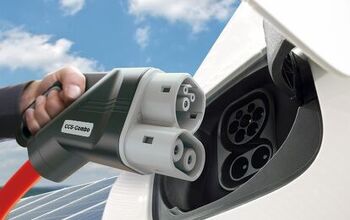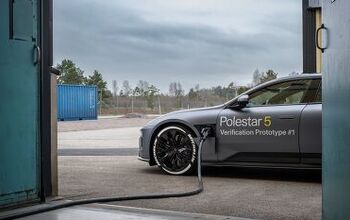Ford, BMW, VW, Daimler Prepare European Charging Network

Established German automakers, partnered with Ford Motor Co., are beginning construction on their pan-European fast-charging network this year. The plan is to expand charging points along highways — thus making cross-continent easier for EV owners and, more importantly, future electric-car buyers.
While none of that affects us in the West, the plot does provide some insight as to how quickly we might be able to expect something similar to take hold. Now called “Ionity,” VW announced it is roping in Porsche and Audi to help construct 400 high-power charging (HPC) stations by 2020. The first 20 charging stations are scheduled to open by the end of this year in Germany, Norway, and Austria.
The venture’s chief executive, Michael Hajesch, says Ionity wants grow that number to 50 by early 2018. “The first pan-European HPC network plays an essential role in establishing a market for electric vehicles. Ionity will deliver our common goal of providing customers with fast charging and digital payment capability, to facilitate long-distance travel,” Hajesch explained.
While starting the project in Germany and growing it out from there omits the whole of Europe from initial enjoyment, it does allow it to be genuinely functional for a smaller region. Theoretically, the United States could do the same thing and kind of is with VW’s Electrify America subsidiary — which is spending nearly half of its $2 billion budget in California. However, the majority of fast-charging stations built near North American highways thus far have been done by Tesla Motors or as part of state-funded projects.
Back in Europe, the Ionity charging stations are to be set roughly 120 km apart from each other. Most are planned to include facilities and shopping via Tank & Rast and Circle K. Capacity is said to be “up to 350 kW per charging point,” using the European charging standard Combined Charging System to significantly reduce charging times compared to existing systems.
“The launch of Ionity represents a breakthrough in the move towards a comprehensive rapid charging infrastructure in Europe”, said the chairman of Porsche’s executive board, Oliver Blume. “Creating a functioning charging infrastructure is necessary for ensuring electromobility is accepted and further expanded. With the rapid charging network from Ionity, we are ensuring that our customers can use electric cars on long journeys without compromising on convenience. These high-charging stations are capable of charging our Mission E to 80 per cent in just 15 minutes – equivalent to a range of 400 kilometres.”
[Image: Porsche]

A staunch consumer advocate tracking industry trends and regulation. Before joining TTAC, Matt spent a decade working for marketing and research firms based in NYC. Clients included several of the world’s largest automakers, global tire brands, and aftermarket part suppliers. Dissatisfied with the corporate world and resentful of having to wear suits everyday, he pivoted to writing about cars. Since then, that man has become an ardent supporter of the right-to-repair movement, been interviewed on the auto industry by national radio broadcasts, driven more rental cars than anyone ever should, participated in amateur rallying events, and received the requisite minimum training as sanctioned by the SCCA. Handy with a wrench, Matt grew up surrounded by Detroit auto workers and managed to get a pizza delivery job before he was legally eligible. He later found himself driving box trucks through Manhattan, guaranteeing future sympathy for actual truckers. He continues to conduct research pertaining to the automotive sector as an independent contractor and has since moved back to his native Michigan, closer to where the cars are born. A contrarian, Matt claims to prefer understeer — stating that front and all-wheel drive vehicles cater best to his driving style.
More by Matt Posky
Latest Car Reviews
Read moreLatest Product Reviews
Read moreRecent Comments
- W Conrad I'm not afraid of them, but they aren't needed for everyone or everywhere. Long haul and highway driving sure, but in the city, nope.
- Jalop1991 In a manner similar to PHEV being the correct answer, I declare RPVs to be the correct answer here.We're doing it with certain aircraft; why not with cars on the ground, using hardware and tools like Telsa's "FSD" or GM's "SuperCruise" as the base?Take the local Uber driver out of the car, and put him in a professional centralized environment from where he drives me around. The system and the individual car can have awareness as well as gates, but he's responsible for the driving.Put the tech into my car, and let me buy it as needed. I need someone else to drive me home; hit the button and voila, I've hired a driver for the moment. I don't want to drive 11 hours to my vacation spot; hire the remote pilot for that. When I get there, I have my car and he's still at his normal location, piloting cars for other people.The system would allow for driver rest period, like what's required for truckers, so I might end up with multiple people driving me to the coast. I don't care. And they don't have to be physically with me, therefore they can be way cheaper.Charge taxi-type per-mile rates. For long drives, offer per-trip rates. Offer subscriptions, including miles/hours. Whatever.(And for grins, dress the remote pilots all as Johnnie.)Start this out with big rigs. Take the trucker away from the long haul driving, and let him be there for emergencies and the short haul parts of the trip.And in a manner similar to PHEVs being discredited, I fully expect to be razzed for this brilliant idea (not unlike how Alan Kay wasn't recognized until many many years later for his Dynabook vision).
- B-BodyBuick84 Not afraid of AV's as I highly doubt they will ever be %100 viable for our roads. Stop-and-go downtown city or rush hour highway traffic? I can see that, but otherwise there's simply too many variables. Bad weather conditions, faded road lines or markings, reflective surfaces with glare, etc. There's also the issue of cultural norms. About a decade ago there was actually an online test called 'The Morality Machine' one could do online where you were in control of an AV and choose what action to take when a crash was inevitable. I think something like 2.5 million people across the world participated? For example, do you hit and most likely kill the elderly couple strolling across the crosswalk or crash the vehicle into a cement barrier and almost certainly cause the death of the vehicle occupants? What if it's a parent and child? In N. America 98% of people choose to hit the elderly couple and save themselves while in Asia, the exact opposite happened where 98% choose to hit the parent and child. Why? Cultural differences. Asia puts a lot of emphasis on respecting their elderly while N. America has a culture of 'save/ protect the children'. Are these AV's going to respect that culture? Is a VW Jetta or Buick Envision AV going to have different programming depending on whether it's sold in Canada or Taiwan? how's that going to effect legislation and legal battles when a crash inevitibly does happen? These are the true barriers to mass AV adoption, and in the 10 years since that test came out, there has been zero answers or progress on this matter. So no, I'm not afraid of AV's simply because with the exception of a few specific situations, most avenues are going to prove to be a dead-end for automakers.
- Mike Bradley Autonomous cars were developed in Silicon Valley. For new products there, the standard business plan is to put a barely-functioning product on the market right away and wait for the early-adopter customers to find the flaws. That's exactly what's happened. Detroit's plan is pretty much the opposite, but Detroit isn't developing this product. That's why dealers, for instance, haven't been trained in the cars.
- Dartman https://apnews.com/article/artificial-intelligence-fighter-jets-air-force-6a1100c96a73ca9b7f41cbd6a2753fdaAutonomous/Ai is here now. The question is implementation and acceptance.


































Comments
Join the conversation
"While none of that affects us in the West..." Huh? "The West" includes all of the original members of NATO (most of which are European), together with a number of other European countries. So, this project affects most people in the geopolitical West.
The only effect it might have in America is which type of charging connection - CCS or CHAdeMO - will be utilized. I know BMW uses CCS as does GM but Nissan uses CHAdeMO. If one standard becomes more prevalent it could end this "VHS vs. Betamax" charging system we have today. Not to mention Tesla off in their own little corner